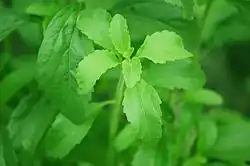Portal:Food/Selected ingredient/8

Stevia (/ˈstiːviə, ˈstɛviə/) is a sweet sugar substitute that is about 50 to 300 times sweeter than sugar. It is extracted from the leaves of Stevia rebaudiana, a plant native to areas of Paraguay and Brazil. The active compounds in stevia are steviol glycosides (mainly stevioside and rebaudioside). Stevia is heat-stable, pH-stable, and not fermentable. Humans cannot metabolize the glycosides in stevia, and it therefore has zero calories. Its taste has a slower onset and longer duration than that of sugar, and at high concentrations some of its extracts may have an aftertaste described as licorice-like or bitter. Stevia is used in sugar and calorie-reduced food and beverage products as an alternative for variants with sugar.
The plant Stevia rebaudiana has been used for centuries by the Guaraní peoples of South America, who called it ka'a he'ê ("sweet herb"). The leaves have been used traditionally for hundreds of years in both Paraguay and Brazil to sweeten local teas, and as a "sweet treat". (Full article...)